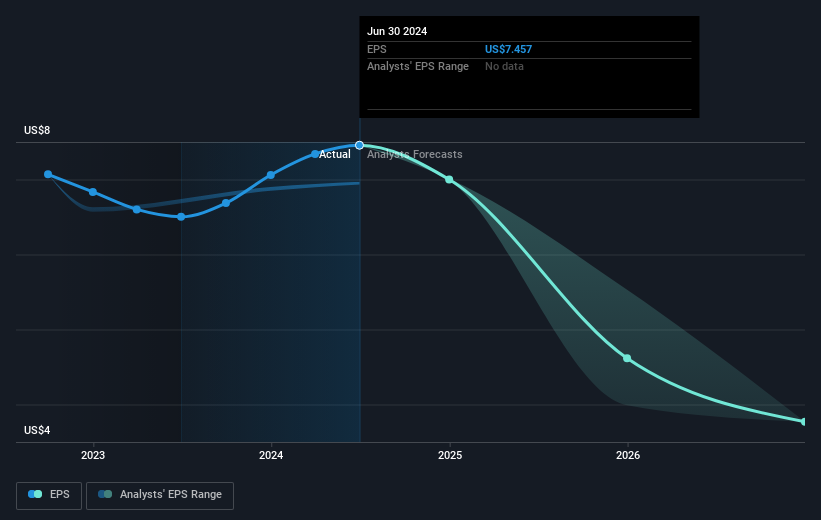- United States
- /
- Electric Utilities
- /
- NasdaqGS:OTTR
The total return for Otter Tail (NASDAQ:OTTR) investors has risen faster than earnings growth over the last five years

It might be of some concern to shareholders to see the Otter Tail Corporation (NASDAQ:OTTR) share price down 13% in the last month. On the bright side the share price is up over the last half decade. Unfortunately its return of 54% is below the market return of 99%.
While the stock has fallen 6.4% this week, it's worth focusing on the longer term and seeing if the stocks historical returns have been driven by the underlying fundamentals.
See our latest analysis for Otter Tail
To paraphrase Benjamin Graham: Over the short term the market is a voting machine, but over the long term it's a weighing machine. One way to examine how market sentiment has changed over time is to look at the interaction between a company's share price and its earnings per share (EPS).
Over half a decade, Otter Tail managed to grow its earnings per share at 30% a year. This EPS growth is higher than the 9% average annual increase in the share price. Therefore, it seems the market has become relatively pessimistic about the company. The reasonably low P/E ratio of 10.92 also suggests market apprehension.
You can see below how EPS has changed over time (discover the exact values by clicking on the image).

We know that Otter Tail has improved its bottom line over the last three years, but what does the future have in store? Take a more thorough look at Otter Tail's financial health with this free report on its balance sheet.
What About Dividends?
When looking at investment returns, it is important to consider the difference between total shareholder return (TSR) and share price return. Whereas the share price return only reflects the change in the share price, the TSR includes the value of dividends (assuming they were reinvested) and the benefit of any discounted capital raising or spin-off. It's fair to say that the TSR gives a more complete picture for stocks that pay a dividend. In the case of Otter Tail, it has a TSR of 77% for the last 5 years. That exceeds its share price return that we previously mentioned. The dividends paid by the company have thusly boosted the total shareholder return.
A Different Perspective
Otter Tail shareholders are up 2.8% for the year (even including dividends). But that return falls short of the market. On the bright side, the longer term returns (running at about 12% a year, over half a decade) look better. It's quite possible the business continues to execute with prowess, even as the share price gains are slowing. While it is well worth considering the different impacts that market conditions can have on the share price, there are other factors that are even more important. Consider for instance, the ever-present spectre of investment risk. We've identified 2 warning signs with Otter Tail (at least 1 which can't be ignored) , and understanding them should be part of your investment process.
But note: Otter Tail may not be the best stock to buy. So take a peek at this free list of interesting companies with past earnings growth (and further growth forecast).
Please note, the market returns quoted in this article reflect the market weighted average returns of stocks that currently trade on American exchanges.
New: AI Stock Screener & Alerts
Our new AI Stock Screener scans the market every day to uncover opportunities.
• Dividend Powerhouses (3%+ Yield)
• Undervalued Small Caps with Insider Buying
• High growth Tech and AI Companies
Or build your own from over 50 metrics.
Have feedback on this article? Concerned about the content? Get in touch with us directly. Alternatively, email editorial-team (at) simplywallst.com.
This article by Simply Wall St is general in nature. We provide commentary based on historical data and analyst forecasts only using an unbiased methodology and our articles are not intended to be financial advice. It does not constitute a recommendation to buy or sell any stock, and does not take account of your objectives, or your financial situation. We aim to bring you long-term focused analysis driven by fundamental data. Note that our analysis may not factor in the latest price-sensitive company announcements or qualitative material. Simply Wall St has no position in any stocks mentioned.
About NasdaqGS:OTTR
Otter Tail
Engages in electric utility, manufacturing, and plastic pipe businesses in the United States.
Established dividend payer with adequate balance sheet.


